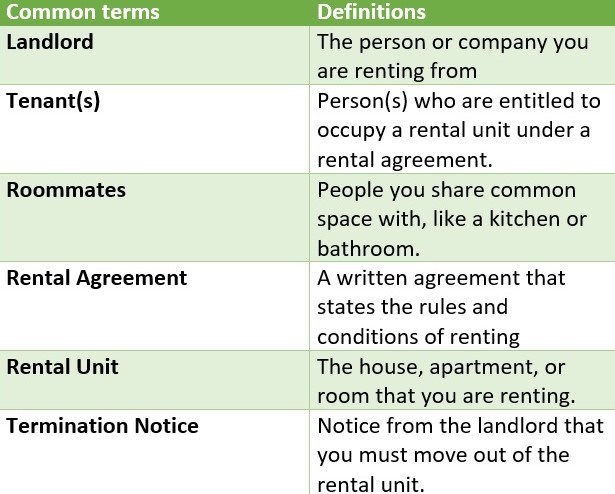Rental Agreements
A lease or a rental agreement is a legal contract that defines your rights and responsibilities in terms of a rental property. The Residential Tenancies Act (RTA) defines the lease, or rental agreement as a written, oral or implied agreement between a landlord and a tenant in which the tenant is granted the right to use or occupy residential premises on the condition rent is paid.
If you enter into a verbal rental agreement, the landlord must provide you with a written notice containing all of the information found in the Rental Agreement Notice Regulations.
It is important that you understand and know what you are signing. By understanding the terms of your lease, you will be better prepared to handle difficult situations if they arise. Remember, if you don’t have a written rental agreement which is signed by you and your landlord, you don’t have any protection from the Newfoundland Residential Tenancies Act (RTA).
There are two types of rental agreements:
Fixed term agreement (6-12 months) and Temporary term agreement (week-to-week or month-to-month). The type of rental agreement will determine when the rent is due and when the notice of termination should be given by the landlord or tenant.
- A fixed term agreement is not less than 6 months and not more than 12 months. For a fixed term agreement, you must give two months notice before the end of the lease. If you cannot stay the entire year, you might be able to sublet (see the sublet section).
- For a month-to-month lease, you must give one month's notice before vacating.
- For a week-to-week lease not less than 7 days before the end of a rental period.
Can I change my mind and back out after signing the lease? From the moment you agree to the lease, you are responsible for carrying the lease until the end of its term. You cannot cancel without giving whatever notice period is required by the lease, or by the Residential Tenancies Act.

Do I get a copy of signed rental agreement from the landlord? Yes, the landlord should provide the tenants with a duplicate copy of the rental agreement within 10 days after signing by all parties. If it’s been ten days and you still haven’t received it, make sure to contact your landlord. If the landlord fails to do this, you are not obligated to pay rent until you receive a copy of the rental agreement.
Must landlord give me a copy of the Residential Tenancies Act? Yes, according to the Section 5 and 6 of the Residential Tenancies Act, a landlord must provide a copy of the Act, without cost, to the tenant who is entering into a rental agreement.
Am I responsible for insuring my personal belonging? Yes, the tenant is responsible for insuring their personal belongings. A tenant’s personal belongings are not covered by whatever insurance the landlord may have on the property. For example, if a house with an apartment burns down, the tenant is responsible for damages to their personal belongings; the landlord’s insurance will not usually cover these damages. See Tenant Insurance section for more information.
What is a Rental Premises Condition Report Form?
The Rental Premises Condition Report Form is usually completed, signed and dated by both tenant and landlord during the premises condition inspections at the beginning and end of the rent term. A tenant can use it to show there were damages before the tenant moved in. A landlord can use it to show damages that were not there before the tenant moved in.
The promises should be vacant during an incoming and outgoing inspection, unless the landlord and tenant agree otherwise. The landlord and tenant should do the inspections together and write down any damages such as holes, scratches and burns. The landlord and tenant should sign and keep a copy of the report. If a landlord or tenant does not want to participate in an inspection report, the landlord or tenant should complete the inspection report, preferably with a witness, and provide a copy to the other party. Many landlords and tenants take pictures of the conditions in the rental properties or videotape them at the start and at the end of the tenancy. The Rental Premises Condition Report can be used for this purpose.
See the Standard Rental Agreement according to the Newfoundland Residential Tenancies Act. Rental agreement usually includes the following information:
- Contact information for your landlord (mailing address, phone number and email address).
- Your name and signature (if you have roommates, each of your names and signatures are needed).
- When your tenancy begins and ends and who to give important information.
- The number of people on the lease.
- Review any rules included in the lease.
- What is the security deposit amount? If I leave, when do I get my security deposit back? (See Security Deposite)
- What is the rent and what's included (heat, lights, hot water, cable/Internet, etc)?
- The monthly rent, including when, where and how it should be paid. (See Rental Payment)
- Is tenant insurance a mandatory requirement for the unit? (See Tenant Insurance)
- If I leave, are there any automatic charges that I will be billed for like carpet cleaning, garbage removal, general repairs, etc.?
- Am I responsible for any damages/repairs caused by other people on the lease?
- Can I sublet my apartment if I have to move? (See Subleting/Assigning)
- Make sure you are aware of the consequences if one of your roommates moves out (will your rent change or go up?).
- Is there parking? Is there a cost or is it included?
Please note that any change or addition to a lease should always be mutual consent and recorded in writing.